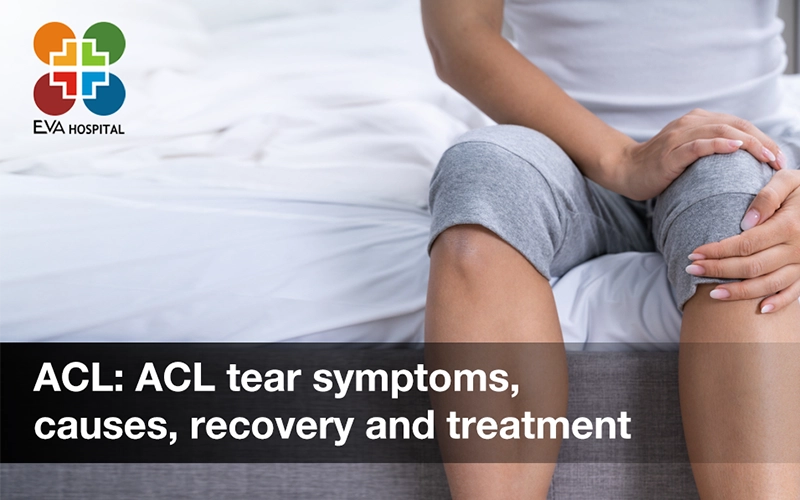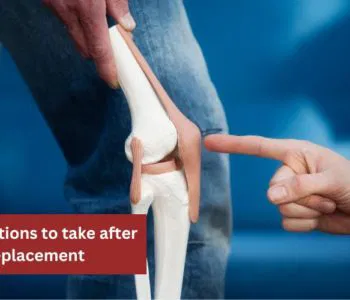ACL: ACL Tear Symptoms, Causes, Recovery and Treatment
 Orthopaedic
Orthopaedic
ACL: ACL Tear Symptoms, Causes, Recovery and Treatment
ACL tear is an extremely common knee injury, particularly known to affect sports persons involved in football, basketball, volleyball, and skiing. In the majority of cases, an ACL injury is a result of making a wrong movement on part of the patient.
However, to have a better understanding of what ACL tear is, understanding the anatomical relevance of the ACL is highly relevant.
What is ACL?
Your knee is basically a hinge joint, formed by the femur, the tibia and the patella. It is made of bones, cartilage, ligaments, and tendons. The ACL, the acronym for anterior cruciate ligament, is one of the 4 ligaments that hold your knee together, and connect your thighbone (the femur) to your shinbone (the tibia). Running diagonally in the middle of the knee, ACL controls how far ahead the tibia can slide relative to the femur while also providing rotational stability to the knee.
Ligaments that hold the knee together
- Medial collateral ligament or MCL
- Lateral collateral ligament or LCL
- Anterior cruciate ligament or ACL
- Posterior cruciate ligament or PCL
What is an ACL injury?
An ACL injury is a tear or sprain of the anterior cruciate ligament, caused often by suddenly made the wrong movement.
For instance, in sporting events like football, baseball, volleyball, and skiing, in which sudden maneuvering of the knee is involved, there is a high probability of an ACL injury.
ACL Tear: Types
An ACL injury can either be a partial tear of the ligament or a complete tear. It is categorized in the following 3 types:
Grade-I: Fibers of the ligament are stretched without any tear
Grade-II: Fibers of the ligament are partially torn
Grade-III: Fibers of the ligament are completely torn
Causes of an ACL Tear
- Jumping and landing
- Swift stops while running
- Pivoting with your foot firmly planted
- Sudden directional changes
- Sudden pivoting maneuver during sports football and basketball
- Collusion
- Work injuries
- Automobile accidents
ACL tear: Symptoms
- Popping or snapping sound at the time of injury
- Immediate swelling of the knee area
- Immobility
- Instability
- Severe pain
ACL tear: A risk factor
While people of all ages and sexes and physical conditions are equally vulnerable, women are more prone to having their ACL torn because they tend to put more pressure on their knee because of their biomechanics. ACL injury is also common among young children.
People prone to having an ACL tear
- Footballers
- Basketball players
- Gymnasts
- Volleyball players
- Downhill skiers
- Workers involved in Physical jobs
- Women
- Children
Factors leading to ACL injury
- Faulty conditioning
- Faulty movement techniques
- Ill-fitting footwear
- Playing on an unfamiliar ground
- ACL tear: Treatment
As soon as you discover any symptoms of an ACL tear, consult your doctor immediately to determine the extent of the injury and seek proper medical treatment. Based on your symptoms, a specialist would recommend the following ACL tear treatments:
Nonsurgical treatments
- Icing
- Immobilization
- Bracing
- Physiotherapy
Surgical treatments
An orthopedic surgeon would perform an ACL reconstruction surgery to replace a torn ACL. In the surgery, a small incision will be made to allow access to a video camera and surgical instruments to the joint space.
Post-surgery precautions
It is pertinent to mention here that those with a history of ACL injury are at higher risk of developing long-term degenerative changes such as arthritis, osteoarthritis and meniscal damage in future. To avoid this, plan an expert-adviced work-out progamme to help strengthen leg muscles.
FAQs
Can ACL injury heal on its own?
No, an ACL injury can’t heal on its own because of the fact that there is no blood supply to this ligament.
Can you walk with an ACL injury?
Immobility is one of the symptoms of an ACL tear. But, immobility may or may not occur despite an ACL tear.
How long does an ACL injury heal?
Recovery from an ACL injury can last between 6 to 9 months.
Is an ACL injury serious?
Since an ACL tear can leave you immobile, it is recommended that you immediately consult a doctor in case any injury to your knee shows symptoms of an ACL tear.









